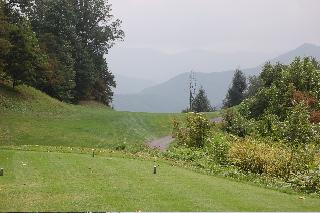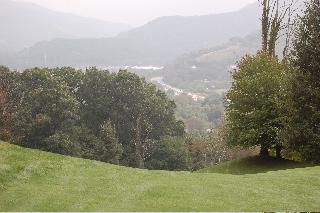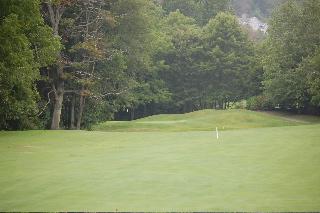

It is easy to lose one's balance, almost literally and definitely figuratively, on the 15th hole at Laurel Ridge. The tee shot (top) should be played down the left side of the blind spot to take advantage of the dramatic dropoff (bottom above) in the fairway. Hit it where you are aiming, pray you find your ball, and you can count on a 350-yard drive and a reasonable second shot to the 600 yard hole.
After a week of golf in the mountains of North Carolina, I have come to the conclusion that a bizarrely routed hole or two is inevitable on layouts squeezed into elevated and craggy landmasses. Even respectable designers are sometimes forced to go overboard at the specter of moving mountains. I played mountain layouts last week by such notables as Arnold Palmer and Bob Cupp, as well as one by neophyte designer Morris Hatalsky, a pro golfer on the senior tour. I ended the week at Tom Fazio's Bright's Creek, a valley course that looks up to the mountains and presented the most "normal" routing of the week, by a long shot (no pun intended).
Stupid hole?
I played Cupp's Laurel Ridge course in Waynesville, NC, and although I found much to like about it, I would not shed a tear if the owners tore up and reworked one of the holes, the par 5 15th. I don't think the members would mind very much either; two of them played through as I was searching for my tee shot in the middle of the fairway. "Stupid hole, isn't it?" one of them commiserated.
Indeed. The 15th is the shortest 600-yard hole you are likely to ever play since a good drive can roll well beyond the 300-yard mark; that is, if you can find it. I hit my drive at a large slope on the left that I was certain would kick the ball right and way down the hill. Of course, like many tee shots at Laurel Ridge, this one was blind, and depending on where on the hill you hit, you could be in the left rough beyond the hill, the right rough across the fairway, or down the middle. With even a modest bounce, you should have a decent shot to make the green on the par 5 in two shots since the approach plays downhill as well, and about two clubs less than normal. Frustrated with the lost ball, I demurred on going back to the tee and then sculled a 3-iron hybrid shot straight toward the green. Straight doesn't matter at the 15th at Laurel Ridge; I could not find the ball among the swales and rough that guarded the 80 yards in front of the green. I even looked behind the green thinking it might have hit hard off the backside of one of those humps. I slumped back to the cart and recorded the maximum score permitted for my handicap.
300-yard mark; that is, if you can find it. I hit my drive at a large slope on the left that I was certain would kick the ball right and way down the hill. Of course, like many tee shots at Laurel Ridge, this one was blind, and depending on where on the hill you hit, you could be in the left rough beyond the hill, the right rough across the fairway, or down the middle. With even a modest bounce, you should have a decent shot to make the green on the par 5 in two shots since the approach plays downhill as well, and about two clubs less than normal. Frustrated with the lost ball, I demurred on going back to the tee and then sculled a 3-iron hybrid shot straight toward the green. Straight doesn't matter at the 15th at Laurel Ridge; I could not find the ball among the swales and rough that guarded the 80 yards in front of the green. I even looked behind the green thinking it might have hit hard off the backside of one of those humps. I slumped back to the cart and recorded the maximum score permitted for my handicap.
Okay, that's out of my system. Up until the 15th, I had no complaints beyond a few nitpicks. A dramatic new clubhouse is rising behind the 9th and 18th greens, and perhaps that has diverted some of the attention from the course. Turf around the collars of some greens was a little spotty, and twice I moved my ball from hardpan between two tufts of grass. Also, the tee markers and some of the signs on the course were in less than pristine condition; one wooden sign had come loose from its stake and was hanging vertically; there seemed to be plenty of workers driving around in carts, and I would have thought someone would have stopped to fix it.
These things sometimes happen at a club approaching 25 years of operation, and new owner Sherell Johnson has communicated to members his plans to address some of the infrastructure issues, such as rebuilding tees (I thought they looked pretty good, actually), improving the driving range, adding a practice chipping green or two, and remodeling the rest rooms on the golf course. These are all smart things to do as the daily fee club moves toward private status next year - just 80 more members to go - but the pressure will be on Mr. Johnson and his staff to match the condition of the course to the new clubhouse and the rest of the amenities. He has a fine layout to work with, the greens are in excellent shape, and I had only one bad lie all day in the fairways.
communicated to members his plans to address some of the infrastructure issues, such as rebuilding tees (I thought they looked pretty good, actually), improving the driving range, adding a practice chipping green or two, and remodeling the rest rooms on the golf course. These are all smart things to do as the daily fee club moves toward private status next year - just 80 more members to go - but the pressure will be on Mr. Johnson and his staff to match the condition of the course to the new clubhouse and the rest of the amenities. He has a fine layout to work with, the greens are in excellent shape, and I had only one bad lie all day in the fairways.
Beautiful and scary
Laurel Ridge, which plays from the base of a 4,000-foot mountain and up part of its side, features elevation changes and vistas so dramatic that they threaten to distract your golf swing. The layout starts out quite mild, with the first three holes spread out in front of the tee boxes, nothing blind, nothing too long. I played from the blue tees at 6,550 yards and should have known that the 138 slope was a better signal of what was to come than the 70.5 course rating. But after an opening bogey and two pars, I thought Laurel Ridge would be typical of Bob Cupp's coastal courses I've played, nicely formatted but not overly challenging.
So much for assumptions. Beginning with the fourth hole, a longish par 4 with a stream crossing the end of the fairway 80 yards in front of the green, out-of-bounds stakes right and left, and a tree that shuts off any approach from the left edge of the fairway, the layout not only turned challenging but also occasionally nasty, with surprises around corners and over hills. I made a note after I played #4 that reads: "If this is the #5 handicap hole on the course, I can't wait to see #s 1 thru 4."
I didn't have to wait long, as the 7th hole, a par 5, was rated the toughest on the course for what appeared two reasons. First was the drive, a carry from the blue tees (520 yards) of about 195 yards to a narrow fairway. The lay-up shot was fairly routine to near the end of the fairway, where a stream awaited (it ran along the left side of the green as well). The green was deep, and the hole was almost precisely on top of a ridge that ran across the putting surface about two-thirds of the way back. Leave the ball short of the ridge, and you were courting a three putt. True to form and the designer's intention, I left the ball toward the front of the green, didn't get my first putt up to the pin, watched it come halfway back down the hill, and made a 6.
from the blue tees (520 yards) of about 195 yards to a narrow fairway. The lay-up shot was fairly routine to near the end of the fairway, where a stream awaited (it ran along the left side of the green as well). The green was deep, and the hole was almost precisely on top of a ridge that ran across the putting surface about two-thirds of the way back. Leave the ball short of the ridge, and you were courting a three putt. True to form and the designer's intention, I left the ball toward the front of the green, didn't get my first putt up to the pin, watched it come halfway back down the hill, and made a 6.
Like Kathleen Turner in the movie "Body Heat," the par 4 9th hole at Laurel Ridge was both beautiful and scary. With a notch in the hill in the middle of the fairway, the direction for the tee shot was clear. The approach was a delight for the eyes if not the nerves, an all-carry shot to an elevated green guarded by a pond and three small bunkers. Lurking beyond was the large and rustic clubhouse, slated to open next spring.
Giveth and taketh
Sometimes Cupp gives you a break and then promptly snatches it away. I thought the par 4 16th was a refreshing change, a dogleg right that required
As the #4 handicap hole, the 18th was not at all overrated. The tee shot needed to catch a downhill slope in order to bound down the fairway to leave a short approach to an elevated green slanted from near right to back left. Anything but hitting the green in regulation would leave a chip shot - or worse, a drop from the stream in front or the pond at left - that could spell a bogey finish. It was a fair but tough way to end a round marred only by that 15th hole and a half dozen lost balls.
Age 49, the new "junior"
The Laurel Ridge community literally looks down on the golf course. Some homes are sited on lots nearly 4,000 feet
 in elevation, and the twisting roads to the top of the community are both exhilarating and a little intimidating the first time you attempt them. Some opt for golf carts as their mode of in-community transportation, as does the mother who dropped her son off at Laurel Ridge's attractive pool and tennis complex as I played one of the holes on the back nine. Some home sites remain in the developer's portfolio, but just two sites are available with golf course views (each is 8/10 of an acre and priced at $295K). Homes run the entire range, from mid-six figures into the millions, especially for the exotic and large homes perched on the side of the mountain.
in elevation, and the twisting roads to the top of the community are both exhilarating and a little intimidating the first time you attempt them. Some opt for golf carts as their mode of in-community transportation, as does the mother who dropped her son off at Laurel Ridge's attractive pool and tennis complex as I played one of the holes on the back nine. Some home sites remain in the developer's portfolio, but just two sites are available with golf course views (each is 8/10 of an acre and priced at $295K). Homes run the entire range, from mid-six figures into the millions, especially for the exotic and large homes perched on the side of the mountain. Golf membership in the semi-private club is a reasonable $6,000, but the truly unique aspect of membership is the definition of "junior." A junior at Laurel Ridge is between the ages of 21 and 49, the most liberal designation I have encountered. Juniors pay just $3,000 to join, definitely an encouragement to young families to sign up and a feather in the cap for developer Johnson and his staff. Other types of memberships are available as well, but with the new clubhouse and a renewed marketing push, the club and its members expect to reach fully private status next year, possibly by the time the clubhouse opens in the spring. At that time, they intend to raise the joining fees to $9,000 for full golf for the over 50 crowd.
Buy, with an option to rent
Laurel Ridge does not offer houses on a rental program for those vacation homeowners who want to generate some extra income. But just over the mountain toward the Maggie Valley area, Johnson owns 1,000 acres called Smoky
Houses in Smoky Mountain Retreat range from $550,000 to $3.2 million depending, of course, on size and view, although most views seemed spectacular during my drive through. But perhaps the best feature of all is the rental program. If you purchase a home in the community and put it on the rental program, your guests can play at Laurel Ridge for just $75 per round. The management fee, which includes housekeeping, routine maintenance and marketing of your property to renters is just 20%, the lowest anywhere. (My wife and I decided not to rent our vacation home on the coast eight years ago when we were told the fee would be 42%.) Smoky Mountain Retreat's back gate leads straight down to Laurel Ridge and the golf course, which is open year round, about a 10-minute drive. The golf course at Maggie Valley is less than 10 minutes away, out the front of the community.
Rental history on display
If you are serious about a vacation property to rent and want to see what you might expect in terms of frequency of rental and income, Smoky Mountain Retreat lists the rental schedule for all 43 of the homes on its program (they intend to cap the number they manage at 50). I was surprised at the numbers of days booked for some of the homes. Ms. Pope indicated that, typically, those units with the most bedrooms (they range up to six) have the best rental histories, but homes that might cost around $650,000 to purchase seem to rent often enough to make a serious dent in the costs of ownership.
Smoky Mountain Retreat is a 20-minute ride from Asheville, most of it on I-40. Laurel Ridge is another 10 minutes further. I have plenty more information on Asheville, Laurel Ridge and Smoky Mountain Retreat that I would be happy to share at your request. Contact me, let me know what you are looking for, and I will respond promptly. And if you would like to talk with someone at Laurel Ridge or Smoky Mountain Retreat, I will be pleased to arrange that too.
Laurel Ridge Country Club, 788 Eagle Nest Road, Waynesville, NC. Tel: (828) 456-3200. Web: LaurelRidgeGolf.com. Designed by Robert Cupp. Black tees: 6,904 yards, rating 72.4, slope 146. Blue tees: 6,551/70.5/138. White tees: 6,093/68.8/126. Gold tees: 4,408/66.5/122.

The toughest hole on the course, according to the scorecard, is the par 5 7th. Play your lay-up shot down the left side and the trees make a direct approach impossible. A ridge in the middle of the green makes a two-putt nigh impossible if you are short and the pin is long, or vice versa.



